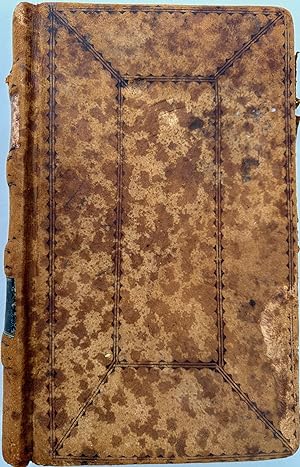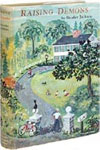RICHARD WELCH S LEDGER A. Commencing 1st March 1844. Ending --- [caption title]
Welch, Richard E. (1814-1881)
From
Bartleby's Books, ABAA, Chevy Chase, MD, U.S.A.
Seller rating 4 out of 5 stars
![]()
AbeBooks Seller since 18 October 1997
About this Item
Description:
Manuscript ledger. 34 cm. 134 pp. Bound in calf (mottled and rubbed), pages browned and foxed, rear hinge separated. A tabbed alphabetical index of customers occupies the first several pages. A few of the blank pages at the end of the ledger have been used by a child (probably Richard Homer Welch) to sketch pencil drawings of ships, some more fully realized than others, including one labeled the "USS Constitution," and another labeled "a man of war containing 28 guns." Some pages have been snipped or cut away, likely by the same child, but no loss of text. Richard Welch was a farmer and lumber dealer in Plaistow, New Hampshire. Many of the entries in this ledger are for sawing boards, logs, and planks. Other entries include agricultural goods, potatoes, apples, Indian meal, meat and tobacco. The town of Plaistow was a customer for "work & lumber," planks, and other items, "per day book." Numerous other customers are mentioned: Benj. Harriman; Jesse Bradley; Mary Greenough; True Kimball; George M. Wilson; Laban Heath; Samuel Kimball; Messrs. White & Parker; Moses Goodchild; William Haseltine; Johnson and Parker Noyes; Peaslee & Bryant; Ebenezer Peaslee & Co., etc. One entry on page 39 records the purchase of bricks, several thousand at a time, by Geo. Motley, Appleton Company, between August 1844 and January 1845. The Appleton Company was incorporated in 1828 and operated two textile mills on the Hamilton Canal in Lowell, Massachusetts. Motley was the company's superintendent. The town of Plaistow was originally part of Haverhill, Massachusetts until the border dispute between New Hampshire and Massachusetts was resolved in about 1741. Plaistow, New Hampshire was incorporated in 1749. According to a history of the town of Plaistow done for its 250th Anniversary in 1999, "Plaistow s early industry consisted of water-powered saw- and gristmills built along the principal streams in town, as well as a small class of artisans, called "mechanicks." Farming, mostly subsistence farming, was the principal means of obtaining a living in early days. Lumber milling was probably the earliest industrial activity in town because clearing land required much logging. These fallen trees were used by carpenters and also provided firewood for homes and later industries like brick making. Sawmills were built in order to mill lumber for building." Richard Welch is listed in the 1850 and 1860 census records as a farmer. He was married with two children when the Civil War began. He raised Company K of the 5th New Hampshire Volunteers, and mustered into service as a Captain in October 1861. His first wife died in 1863, and he remarried in 1865. By 1870, he had moved to Haverhill and listed his occupation as a grocer. With his second wife, he had a son, Richard Homer Welch, who was 9 when the 1880 census records that Richard [the elder] had rheumatism. Richard E. Welch died the next year. Richard Homer Welch added his name below his father's name on the caption title page of the ledger, and must have used the several blank pages as his sketch pad. Seller Inventory # 68126
Bibliographic Details
Title: RICHARD WELCH S LEDGER A. Commencing 1st ...
Publisher: [Plaistow, NH
Publication Date: 1861
Binding: Hardcover
AbeBooks offers millions of new, used, rare and out-of-print books, as well as cheap textbooks from thousands of booksellers around the world. Shopping on AbeBooks is easy, safe and 100% secure - search for your book, purchase a copy via our secure checkout and the bookseller ships it straight to you.
Search thousands of booksellers selling millions of new & used books
New & Used Books
New and used copies of new releases, best sellers and award winners. Save money with our huge selection.
Rare & Out of Print Books
From scarce first editions to sought-after signatures, find an array of rare, valuable and highly collectible books.




